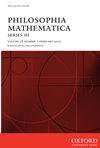数学解释:通过形式证明和概念复杂性进行分析
IF 0.8
1区 哲学
Q2 HISTORY & PHILOSOPHY OF SCIENCE
引用次数: 0
摘要
本文研究内部(或内部)数学解释,即那些似乎解释了所证明定理的数学定理证明。本文的目标是对这些解释进行严格的分析。这将分两步进行。首先,我们将展示如何从数学定理的非正式证明转向涉及证明树及其要素分解的正式表述;其次,我们将展示那些被认为具有解释力的数学证明都显示出从假设到结论的概念复杂性的增加。本文章由计算机程序翻译,如有差异,请以英文原文为准。
Mathematical Explanations: An Analysis Via Formal Proofs and Conceptual Complexity
This paper studies internal (or intra-)mathematical explanations, namely those proofs of mathematical theorems that seem to explain the theorem they prove. The goal of the paper is a rigorous analysis of these explanations. This will be done in two steps. First, we will show how to move from informal proofs of mathematical theorems to a formal presentation that involves proof trees, together with a decomposition of their elements; secondly we will show that those mathematical proofs that are regarded as having explanatory power all display an increase of conceptual complexity from the assumptions to the conclusion.
求助全文
通过发布文献求助,成功后即可免费获取论文全文。
去求助
来源期刊

Philosophia Mathematica
HISTORY & PHILOSOPHY OF SCIENCE-
CiteScore
1.70
自引率
9.10%
发文量
26
审稿时长
>12 weeks
期刊介绍:
Philosophia Mathematica is the only journal in the world devoted specifically to philosophy of mathematics. The journal publishes peer-reviewed new work in philosophy of mathematics, the application of mathematics, and computing. In addition to main articles, sometimes grouped on a single theme, there are shorter discussion notes, letters, and book reviews. The journal is published online-only, with three issues published per year.
 求助内容:
求助内容: 应助结果提醒方式:
应助结果提醒方式:


